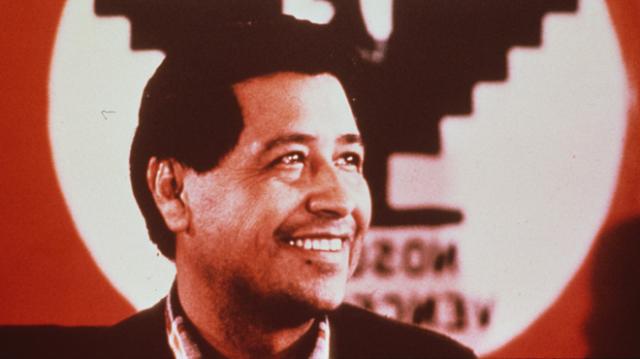Cesar Chavez is a very famous Mexican-American labor leader. He inspired many agricultural workers to stand up and face problems in the work force. Chavez led a series of peaceful protests and strikes to help migrant workers get higher pay, and started a labor movement. The actions that Cesar Chavez took called for national attention. With his relentless attitude, he led many Mexican-Americans to speak up, and to stand up for themselves and the rights that they deserved.
Cesar Chavez was born on March 31, 1927 in North Gila Valley, Arizona. At the age of 10, Chavez’s family had lost their family farm and small grocery store due to the chaos of the Great Depression. Without their farm and family-owned grocery store Chavez’s family had no financial income and were forced to join the migrant farm workers.1 When Cesar was fourteen, his father was in an automobile accident that impeded him from working, so Cesar Chavez felt the need to help his family by working in the fields and postponing his high school education for two years.2 Of course the two years became long forgotten because by the age of 17 Cesar Chavez had enlisted in the U.S. Navy. Chavez served in the Navy for two years before being discharged. Chávez described these two years as the worst years of his life.

Neither his mother nor his father wanted him to enlist in the Navy, but he knew he either had to enlist or get drafted. Instead of being drafted into the Army, he enlisted in the U.S. Navy. His work in the Navy consisted of being a deck hand and crew transport. Chavez was never engaged in combat throughout his two years of service. In a seventy-two-hour pass that Chavez and his navy friends received, they returned to Texas and attended a movie theater. Movie theaters were segregated at that time and “it was just accepted by the Mexicans” that they were to sit “in the quarter-section on the right [of the theater].”3 Chavez felt that he should not have to accept such discrimination, so he sat on the left of the theater. A scandal erupted. Chavez was asked to move back to the right of the theater and when he refused, he was sent to jail. Chavez recalls that the sergeant did not know what to charge him with and started to make phone calls to help him figure out what charges to put on Chavez. Chavez could hear the conversations about charging him with “disturbing the peace” and “being drunk.” After about an hour of deliberation with judges, chief of police, and his fellow police officers, the sergeant lectured Chavez and let him go, but not before threatening to put him in jail for life. This was the first time that Chavez had challenged rules discriminating against him due to his race, but it surely would not be the last.4
When his two years of service up, Chavez returned to work in the fields once again and in 1948 he married Helen Fabela.5 It was shortly after this that Cesar created his credit union with Dolores Huerta, a fellow worker at the Community Service Organization (CSO) that continuously encouraged him to organize farmworkers in order to help them. They would loan money out and help people of all ethnicities.

Since hundreds of people would show up to Chavez’s house because of his credit union, many of the anglos in the area started accusing them, Huerta and Chavez, of being communists, trying to bring an end to the union. Policemen would come in and try to disperse those attending, but Chavez knew the law and knew that they would not be able to put the union down.6 Cesar Chavez and all of those associated with him began being called communists. It was all over the newspapers, and back then the newspaper had a lot of influence on the community. Because of this label, people began disassociating themselves with Chavez due to fear.7
About three years after the start of the credit union, Chavez began his famous strikes, boycotts, and his 25 day fast. Chavez knew he was in for a long ride when he decided to start helping his fellow farm workers. There would be many moments of despair and even more times of joy and excitement.
- Salem Press Biographical Encyclopedia, s.v. “César Chávez,” by Cecilia M. Garcia. ↵
- Jacques E. Levy and Cesar Chavez, Cesar Chavez : Autobiography of La Causa (New York : Norton, 1975.), 73. ↵
- Levy and Chavez, Cesar Chavez : Autobiography of La Causa, 84-85. ↵
- Levy and Chavez, Cesar Chavez : Autobiography of La Causa, 84-85. ↵
- Salem Press Biographical Encyclopedia, s.v.“César Chávez,” by Cecilia M. Garcia. ↵
- Cesar Chavez, directed by Diego Luna (Santa Monica, CA : Lionsgate, 2014), DVD. ↵
- Levy and Chavez, Cesar Chavez : Autobiography of La Causa, 107. ↵



48 comments
Gabriela Medrano
Cesar Chavez was a very influential leader and his legacy continues to reflect upon the Hispanic communities. Good topic to write about, a little broad though. I feel Chavez had accomplished a lot and the article did not express the great weight it was to do so. However, all information was credible as previously I saw a documentary on his journey to success. His rebellious way got him the title he has today and I am sure many farm working families were glad some one like Chavez was there to support them and these families too played a significant role and supported his cause. Well done!
Irene Astran
Cesar Chavez was a very courageous man. I hope that we have strong leaders like him rise up within the coming generations. The United Farm Workers of America organization is still alive and well. They continue to fight for fair wages and reasonable working conditions for farm workers. If anyone reading this comment is interested in taking action and or donating to the organization this is their web address http://ufw.org/
Aaron Mcglown
This is an excellent article. It is very informative with strong sources. I enjoyed reading about Cesar Chavez. The information you presented on Chavez and how he stood up for people and what was fair. I didn’t know he led peaceful protests and about his own credit union. It seems like Chavez had a great impact to people and the community around him.
Zaraly Frasquillo Bejarano
I am from Phoenix, Arizona and I remember always celebrating Cesar Chavez day. I always knew he was an activist of some sort but i really didn’t know what specifically he did. I knew that Mexicans were at some point discriminated but I had never actually heard of a situation in where someone was sent to jail because of it. So this was very informative for me, thank you.
Christian Lozano
Cesar Chavez definitely is a hero in my book, especially after reading about that movie theater incident in the article, I believe he belongs up there with Gandhi and Martin Luther King Jr. I am looking forward to reading part two, good job!
Tina Valdez
It is obvious as to why Cesar Chavez is an important member in history. Often what we learn about Cesar Chavez s as you put it his “famous strikes, boycotts, and his 25 day fast,” so I enjoyed reading about the early part of his life. I was not aware that Cesar Chavez enlisted in the Navy. He had a great deal of courage and a heart for others, certainly a person that should be well known. Great article!
Salvador Rodriguez Gomez
Excellent article! Many people know about Cesar Chavez because of his work and the holiday that celebrates him. That’d really all I have every known about him so it’s nice to read this article and learn about his life before his protests and how he shaped up to be the man that he became.
Aaron Jaramillo
Enjoyed reading your article on Cesar Chavez. Great information on how Chavez took a stand for what he believed was fair. I had heard so much about his peaceful protest that I was unaware that he actually had started his very own credit union with the help of Huerta. Good information.
Nicolas McKay
When people think of racial discrimination, especially during those years, most people forget that Mexican Americans were also discriminated against.Its always inspiring to see someone who sees injustice take a stand and try to change the world just as Cesar Chavez did. I cant wait for part two to come out.
Jacob Hall
This is a great informative article, and I will be honest I have never heard of Cesar Chavez before. However I think that is why I really like this article, because it is about something I did not know. I think you did an excellent job of describing Chavez and his life. An thing thing that I found interesting was that Hispanics had a certain place to sit in a theater. As a matter of fact I never even thought about a theater being a place of segregation, so I found that to be interesting. One thing that I really liked was that you brought up how much influence the newspaper had back then. Now a days people do not really think about it because of all the technology that we have, but back in the day newspaper told people what was going on. So if the newspaper said you were bad then that meant you were bad, even if that wasn’t the case.